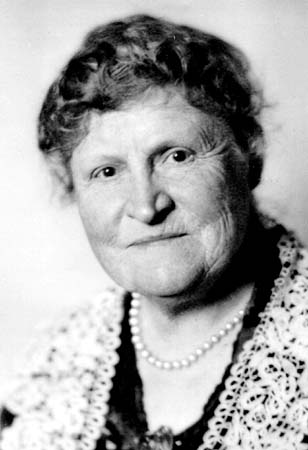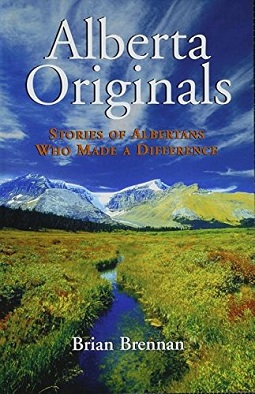Related Research Articles

Events from the year 1928 in Canada.

Events from the year 1929 in Canada.
The Famous Five, also known as The Valiant Five, and initially as The Alberta Five, were five prominent Canadian suffragists who advocated for women and children: Henrietta Muir Edwards, Nellie McClung, Louise McKinney, Emily Murphy, and Irene Parlby. On August 27, 1927, they petitioned the federal government to refer the issue of the eligibility of women to be senator to the Supreme Court of Canada. This petition was the foundation of the Persons Case, a leading constitutional decision. Although most Canadian women had the vote in federal elections and all provinces but Quebec by 1927, the case was part of a larger drive for political equality. This was the first step towards equality for women in Canada and was the start to the first wave of feminism.

Nellie Letitia McClung was a Canadian author, politician, and social activist, who is regarded as one of Canada's most prominent suffragists. She began her career in writing with the 1908 book Sowing Seeds in Danny, and would eventually publish sixteen books, including two autobiographies. She played a leading role in the women's suffrage movement in Canada, helping to grant women the vote in Alberta and Manitoba in 1916. McClung was elected to the Legislative Assembly of Alberta in 1921, where she served until 1926.

Emily Murphy was a Canadian women's rights activist and author. In 1916, she became the first female magistrate in Canada and the fifth in the British Empire after Elizabeth Webb Nicholls, Jane Price, E. Cullen and Cecilia Dixon of Australia. She is best known for her contributions to Canadian feminism, specifically to the question of whether women were "persons" under Canadian law.

Louise McKinney was a Canadian politician, temperance advocate, and women's rights activist. She was the first woman elected into the Legislative Assembly of Alberta and the first woman to serve in a legislature in the British Empire. She served in the Alberta legislature from 1917 to 1921 as a member of the Non-Partisan League. Later she was one of the Famous Five who campaigned successfully for the right of Canadian women to be appointed to the Senate. A former schoolteacher and temperance organizer, she came to Alberta in 1903 as a homesteader.

Henrietta Muir Edwards was a Canadian women's rights activist, author and reformer. She was the eldest of "The Famous Five", along with Emily Murphy, Nellie McClung, Louise McKinney and Irene Parlby, who fought to have women recognized as "persons" under the law, and for the woman's right to vote in elections.

Mary Irene Parlby was a Canadian women's farm leader, activist and politician. She served as MLA in the United Farmers of Alberta government from 1921 to 1935, serving as Minister without portfolio in the Cabinet of Alberta during that time. She worked to implement social reforms that helped farm women and children and was an advocate of public health programs. As a member of the Famous Five, she was one of five women who took the Persons Case first to the Supreme Court of Canada, and then to the British Judicial Committee of the Privy Council for the right of women to serve in the Senate of Canada. From 1930 to 1934, she was one of three Canadian representatives at the League of Nations in Geneva, Switzerland.

Alice Jane Jukes Jamieson was an American and Canadian feminist and magistrate.

Edwards v Canada (AG), also known as the Persons Case (French: l'Affaire « personne »), is a Canadian constitutional case that decided in 1929 that women were eligible to sit in the Senate of Canada. The legal case was put forward by the Government of Canada on the lobbying of a group of women known as The Famous Five—Henrietta Edwards, Nellie McClung, Louise McKinney, Emily Murphy and Irene Parlby. The case began as a reference case by the federal Cabinet directly to the Supreme Court of Canada, which ruled that women were not "qualified persons" and thus ineligible to sit in the Senate. The five women then appealed to the Judicial Committee of the Imperial Privy Council in London, at that time the court of last resort for Canada within the British Empire and Commonwealth. The Judicial Committee overturned the Supreme Court's decision. (The case name lists Edwards as the lead appellant, as her name came first alphabetically.)
Representation by women has been a significant issue in Canadian politics since 1900.
The Alberta Eugenics Board was an agency created by the Alberta government in 1928 that attempted to impose sterilization on a disabled subset of its population, in accordance with the principles of eugenics. It remained active until 1972, when it was dissolved.

Barbara A. Paterson is a Canadian artist, primarily known for her bronze figurative works, specializing in a variety of sculpture media including wax, stone, bronze and welded steel. She is based in Edmonton and is best known for her public sculptures of the "Famous Five."
The history of feminism in Canada has been a gradual struggle aimed at establishing equal rights. The history of Canadian feminism, like modern Western feminism in other countries, has been divided by scholars into four "waves", each describing a period of intense activism and social change. The use of "waves" has been critiqued for its failure to include feminist activism of Aboriginal and Québécois women who organized for changes in their own communities as well as for larger social change.
The National Council of Women of Canada is a Canadian advocacy organization based in Ottawa, Ontario, aimed at improving conditions for women, families, and communities. A federation of nationally-organized societies of men and women and local and provincial councils of women, it is the Canadian member of the International Council of Women (ICW). The Council has concerned itself in areas including women's suffrage, immigration, health care, education, mass media, the environment, and many others. Formed on October 27, 1893, in Toronto, Ontario, it is one of the oldest advocacy organizations in the country. Lady Aberdeen was elected the first president of the National Council of Women of Canada in 1893. Prominent Council leaders included Lady Gzowski, Dr. Augusta Stowe-Gullen, and Adelaide Hoodless.

Maternal feminism is the belief of many early feminists that women as mothers and caregivers had an important but distinctive role to play in society and in politics. It incorporates reform ideas from social feminism, and combines the concepts of maternalism and feminism. It was a widespread philosophy among well-to-do women in the British Empire, particularly Canada, from the late 19th century until after World War I (1914–18). The concept was attacked by later feminists as accepting the paternalist view of society and providing an excuse for inequality.

Alberta Originals: Stories of Albertans Who Made a Difference, originally published by Fifth House under ISBN 1-894004-76-0, is a book of short biographical profiles written by Irish-Canadian author Brian Brennan. It's a sequel to Building a Province: 60 Alberta Lives, which Brennan published a year earlier.

Eugenic feminism was a current of the women's suffrage movement which overlapped with eugenics. Originally coined by the Lebanese-British physician and vocal eugenicist Caleb Saleeby, the term has since been applied to summarize views held by prominent feminists of Great Britain and the United States. Some early suffragettes in Canada, especially a group known as The Famous Five, also pushed for various eugenic policies.

Lizzie Cyr was a Canadian woman known for her role in a seminal Canadian court case. Cyr was charged with "vagrancy" by Calgary Police, in 1917. Vagrancy was, at that time, a euphemism for prostitution. The john who reported her claimed she had infected him with gonorrhea.
References
- ↑ The Women's Legal Education and Action Fund
- ↑ "Persons Day - Status of Women Canada". Archived from the original on 2014-11-24. Retrieved 2014-12-08.
- ↑ "Persons Day - Status of Women Canada". Archived from the original on 2014-11-24. Retrieved 2014-12-08.
- ↑ "Persons Day - Status of Women Canada". Archived from the original on 2014-11-24. Retrieved 2014-12-08.
- 1 2 3 4 5 "1929: Women Become Persons", CBC Archives.
- ↑ "Persons Day - Status of Women Canada". Archived from the original on 2014-11-24. Retrieved 2014-12-08.
- ↑ "Persons Day". 31 March 2021.
- ↑ Six Outstanding Women Receive Governor General's Persons Award Archived 2011-10-31 at the Wayback Machine
- ↑ "Governor General's Awards in Commemoration of the Persons Case | Status of Women Canada". Archived from the original on 2011-09-28. Retrieved 2011-10-21.
- ↑ "Persons Day." Canadianwomen.org. N.p., n.d. Web. 06 Nov. 2014.